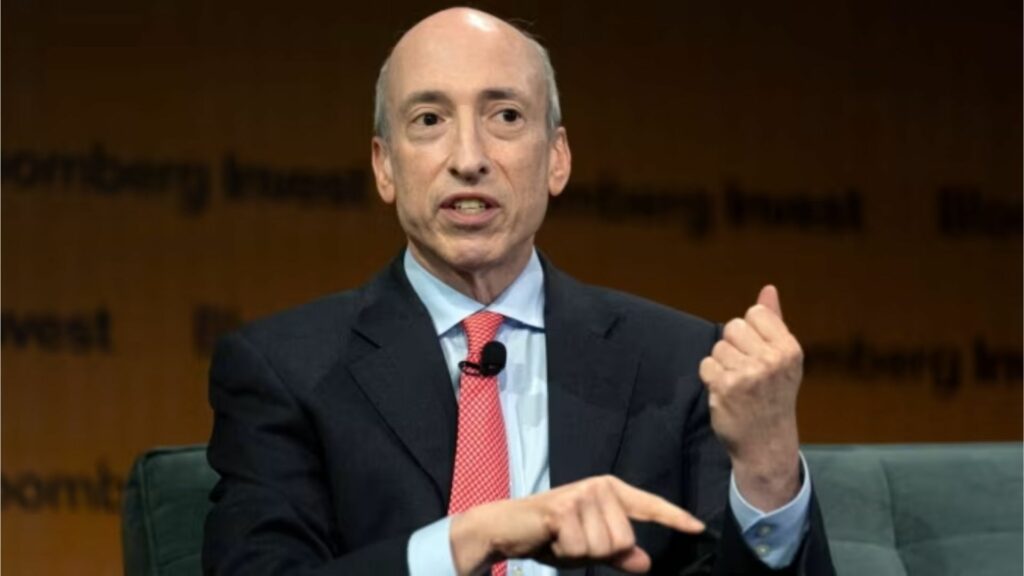Gary Gensler, chair of the U.S. Securities and Exchange Commission (SEC), has announced his resignation, effective 20 January 2025, coinciding with the inauguration of President-elect Donald Trump.
This resignation marks the conclusion of a polarising tenure and sets the stage for a dramatic shift in the SEC’s regulatory approach, particularly toward the crypto industry. As Trump prepares to appoint a successor, the financial world watches with anticipation for what could be a transformative new era.
Gensler’s Legacy: Controversy and Aggressive Regulation
Gary Gensler’s leadership of the SEC was anything but quiet. Appointed in 2021 by President Joe Biden, he brought a bold and controversial agenda to the agency. Gensler made headlines with his insistence on tighter regulations across the financial sector, targeting hedge funds, private equity, and even traditional securities markets. However, his fiercest battles were fought with the crypto industry.
From Ripple and Coinbase to Binance and Kraken, Gensler’s SEC took legal action against some of the biggest names in blockchain. His aggressive “regulation by enforcement” strategy sparked widespread criticism, with crypto firms accusing him of stifling innovation and failing to provide clear regulatory guidelines. The collapse of FTX in 2022 further intensified scrutiny, as Gensler ramped up enforcement actions to hold the industry accountable for alleged misconduct.
Despite his efforts, Gensler faced internal pushback within the SEC. Commissioners like Hester Peirce openly criticised his heavy-handed approach, while staff turnover surged during his first year. These challenges underscored the divisive nature of his tenure, which saw the SEC embroiled in numerous legal battles and industry disputes.
While Gensler’s supporters argue that his actions protected investors and brought much-needed oversight to an unregulated market, his critics view his tenure as overly combative. His departure offers the crypto industry and traditional finance a moment to reassess the future of regulation.
A New Era Under Trump: Candidates and Expectations
Gary Gensler’s resignation comes as President-elect Trump signals a dramatically different vision for the SEC. During his campaign, Trump vowed to overhaul the agency, criticising its bureaucratic inefficiencies and promising a more business-friendly approach. For the crypto industry, this could mean a shift away from enforcement-led regulation towards clearer, innovation-friendly policies.
BREAKING: The $HBAR Board Member and former Binance US CEO Brian Brooks has been named a potential candidate for SEC chairman. 🔥🤯
— MASON VERSLUIS (@MasonVersluis) November 18, 2024
BRIAN BROOKS IS AN ABSOLUTE G!
We need someone like him as SEC Chair.
HBAR WOULD EXPLODE! pic.twitter.com/XFkie4k00G
Rumours are already swirling about potential candidates to replace Gensler. Among them is Teresa Goody Guillén, a seasoned securities lawyer and blockchain advocate, whose pro-crypto stance aligns with Trump’s promise to support the digital asset industry. Other names include Dan Gallagher, the chief legal officer at Robinhood; Brian Brooks, a former acting CEO of Binance US, and Paul Atkins, a former SEC commissioner known for his deregulatory philosophy.
The crypto community is particularly hopeful that a new SEC chair will bring clarity to regulatory ambiguities. Pantera’s chief legal officer, Katrina Paglia, has expressed optimism that many ongoing lawsuits and enforcement actions against crypto firms will “quietly go away” once Gensler steps down. She also speculated that the SEC might shift its focus towards issuing no-action letters—guidance that allows firms to operate without fear of legal repercussions under certain conditions.
As Trump’s administration takes shape, the stakes are high. The incoming SEC chair will not only inherit unresolved legal battles but also a rapidly evolving financial landscape where the line between traditional and decentralised markets is increasingly blurred.
What Lies Ahead for the SEC and Crypto?
Gary Gensler’s resignation signals the end of an era defined by regulatory friction and industry discord. For the SEC, it represents an opportunity to redefine its relationship with the crypto industry, potentially moving toward a framework that balances investor protection with innovation.
Donald Trump said that he will fire Gary Gensler on day 1.
— Crypto University (@TheCryptoU) November 21, 2024
🚨🚨🚨BREAKING: 🇺🇸 Gary Gensler to resign as SEC chair on January 20th.#Crypto #CryptoNews #Trump2024 pic.twitter.com/diH99HxIEK
Under Trump’s leadership, the appointment of a pro-crypto chair could usher in a period of growth for digital assets, with the U.S. regaining its competitive edge in blockchain and fintech innovation. While it remains to be seen who will lead this new chapter, one thing is clear: the regulatory landscape is poised for a significant transformation.
The world will be watching as the Trump administration reshapes the SEC, setting the tone for crypto regulation in the United States and potentially influencing global markets. For now, the industry waits with bated breath, hopeful that the next era will bring clarity, opportunity, and collaboration.

